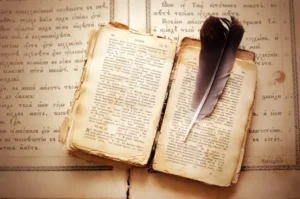POETRY IN ENGLISH LITERATURE- Forms Of Poetry
Poetry in English Literature comes in various forms, each with its unique structure, style, and characteristics. Here are some common types of poetry;
SONNET: A sonnet is a 14-line poem in iambic pentameter, typically with ABABCDCDEFGG or ABBAABBACDCDC rhyme schemes.
HAIKU: Haikus often capture moments of nature or evoke emotions through concise and evocative language. Additionally, a Japanese form of poetry consisting of three lines with a syllable pattern of 5-7-5.
LIMERICK: A humorous poem consisting of five lines with a strict rhyme scheme (AABBA) and a distinctive rhythm. Limericks often feature witty or absurd content.
FREE VERSE: Poetry without strict meter or rhyme gives poets more freedom to express themselves. Consequently, they rely on imagery, rhythm, and other literary devices for effect.
EPIC: A lengthy narrative poem that tells the story of heroic deeds or legendary events. Additionally, epics frequently showcase larger-than-life characters and delve into themes of heroism, honor, and the human condition.
ODE: A lyrical poem expressing admiration or celebration for a person, object, or idea. Odes often have a formal structure and elevated language, serving as a tribute to their subject.
BALLAD: A narrative poem that tells a story, often with a musical quality. Ballads typically have a simple rhyme scheme and meter, making them easy to recite or sing.
SESTINA: A sestina explores a theme through repeated end words, with the envoi concluding and summarizing the developed themes.
VILLANELLE: A villanelle is a structured 19-line poem with a specific rhyme scheme (ABA ABA ABA ABA ABA ABAA), often exploring themes of obsession, memory, or loss with a repeating refrain.
CONCRETE POETRY: Concrete poems use visual word arrangement to enhance the poem’s meaning and may include shapes related to the subject.

POETRY IN ENGLISH LITERATURE- Major English Poems and Poets
Poetry in English Literature is vast, covering centuries of diverse poems. Here are some major poems and poets from different periods and styles.
Beowulf -ANONYMOUS
An epic poem dating back to the 8th century, one of the oldest surviving works of English literature.
The Canterbury Tales – GEOFFREY CHAUCER
A collection of stories written in Middle English, offering a vivid portrait of medieval life.
Paradise Lost – JOHN MILTON
A monumental epic poem exploring the Fall of Man, Satan’s rebellion, and humanity’s redemption.
Sonnet 18 (“Shall I compare thee to a summer’s day?”) – WILLIAM SHAKESPEARE
One of Shakespeare’s most famous sonnets celebrates the beauty of the beloved.
To His Coy Mistress – ANDREW MARWELL
A metaphysical poem advocating carpe diem, urging the beloved to seize the day.
The Flea – JOHN DONNE
Furthermore, this poem delves into the complexities of human relationships.
The Waste Land – T.S ELIOT
A modernist masterpiece, reflecting the disillusionment and fragmentation of post-World War I society.
Dover Beach – MATHEW ARNOLD
A reflective poem expressing Arnold’s concerns about the decline of faith in the face of an increasingly secular world.
Ode to a Nightingale – JOHN KEATS
A Romantic ode exploring the themes of mortality, transience, and the power of art.
On His Blindness – JOHN MILTON
A contemplative sonnet reflecting on the poet’s blindness and God’s expectations.
Ozymandias – PERCY BYSSHE SHELLEY
A sonnet reflecting on the transience of power and the inevitable decline of all human achievements.
Kubla Khan – SAMUEL TAYLOR COLERIDGE
A visionary poem inspired by an opium-induced dream, celebrated for its vivid imagery and musical language.
The Prelude – WILLIAM WORDSWORTH
An autobiographical poem tracing Wordsworth’s development as a poet and his relationship with nature.
